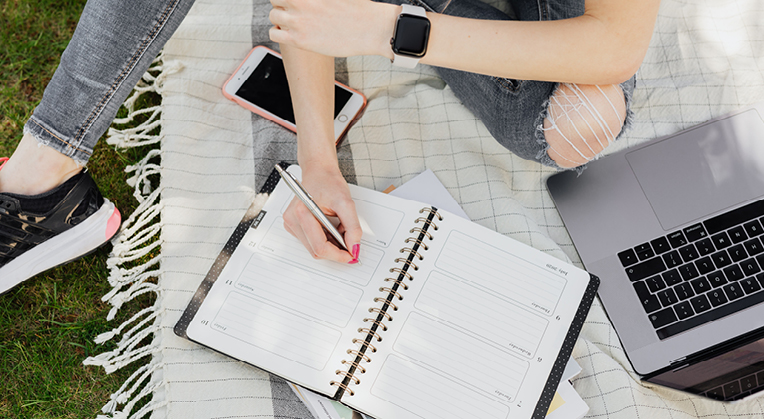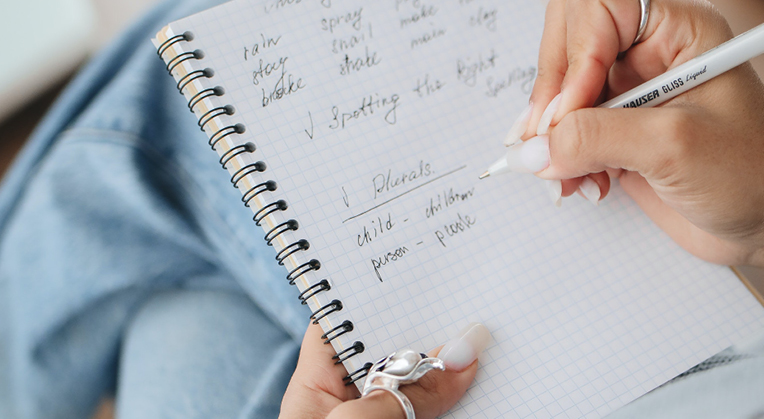10 Study tips for back to school

Back to school is here! That means its time to brush up on your study skills. If you’re feeling overwhelmed by everything, here are 10 simple study tips to help you get started.

1. Create a study schedule
Set up specific times in your calendar for studying.
A consistent study schedule can help your brain recognize the pattern and become more receptive to new information.
Studies show that students are 60% more likely to remember information if they study within 24 hours of learning the new material.

2. Study at your own pace
There is no right or wrong when studying. You’ll find what works for you the best through trial and error.
Whether you digest content quickly, or need time to let the material sink in?There is no need to follow someone else’s speed as only you know what is best for you.
Just remember that slower studying will require that you devote more time.

3. Create your own perfect study space
Pick a space that is comfortable but not too relaxing that you end up falling asleep. It may be the couch, a desk, on the floor, whatever suits you best.
Silence notifications on your phone. Apple now have the option to set up different Focus settings. Make sure to take advantage of this option and customize it to what suits you best.
Set up a study playlist for background music. Some people focus better with soft lo-fi music and some with nature sounds.
Keep your snacks and food ready nearby and within reach for when your stomach starts growling.
Change your study location often as study shows this improves information retention. You can go to cafes or libraries for example.

4. Pick a study method that works best for you
Each indvidual have differet study habits and methods that help them retain information best way
There are many ways to study including:
MNEMONICS: Create a rhyme, a song, a sentence that will connect to the information you’re learning about
FLASHCARDS: Use spaced repetition: set up different sections and schedules for the flashcards in each section
COLOR-CODED NOTES: Study shows found that color can improve a person’s memory performance, particularly warm colors.
THE PQ4R METHOD
-
-
- Preview: Skim through the material before starting
- Question: Ask questions related to the topic
- Read: Read one section at a time and find the answers to your questions
- Reflect: Did you answer all your questions? Do you have new questions?
- Recite: Speak aloud or write in your own notes the answers you’ve gathered
- Review: Look over the material one more time and double check and reflect on the questions you got wrong.
-

5. Take a break
Allow yours to take planned breaks.
Consider a schedule of 50 minutes spent working followed by a 10-minute break. Walk around, stretch but make sure to get back to focus mode once your 10-minute break is done.

6. Take Effective Notes in Class
The things your teacher talks about in class are most likely important topics that will be seen on your exam or homework
The following tips can help you become an efficient and effective note-taker:
• Highlight the main points.
• Use shorthand when possible.
• Jot down keywords or names.
• Use the same consistent organizational system.
• Go old school and use a pen and paper as study shows that it can help you remember information better.

7. Prioritize the Toughest Assignment First
Admit it or not, there are certain subjects that we like more than others.
Save the least challenging work for the end of your studies. Start with the hardest and get it done before moving on.
Ending with the least challenging and your favorite assignments will give you a more positive feeling about your academic goals.

8. Join A Study Group
Studying isn’t necessarily an individual task or activity.
There are benefits to a study group including:
• Hearing from different perspectives and explanations about the same material
• Having someone to discuss topics you don’t understand
• Quizzing each other or playing review games
• Developing communication skills and increase your connections
Gather a few classmates or friends to form your own study group this new semester.

9. Reward Yourself
Give yourself a reward or an incentive for doing your work and accomplishing your goals as it will help you have a more positive experience and attitude towards school and work.
Do it immediately; don’t wait until the test is over to reward yourself. For example, after finishing a tough assignment, treat yourself to a dessert or a relaxing bath.

10. Get some sleep
Get some well-earned sleep after your study session.
Sleep gives your brain a chance to process the information that you’ve learned that day. Studies show that you’re more likely to retain information 24 hours later if you went to bed shortly after learning it.
Not having enough rest will only hinder you during your study sessions by making it harder to focus and remember information.
UPCOMING EVENT

Final Thoughts
Back to school time is a busy time, but it doesn’t have to be stressful. These 10 study tips will help you transition into the new school year. Gain new study habits as you shift priorities. Studying is important but don’t forget to relaxed and get some sleep.

By Shannea Sumabal
Shannea is a web designer and writer with a passion for creating engaging websites and helping clients grow their global web presence. With a background in marketing, she has an interest in creating content and enjoys any opportunity to help people learn to use digital tools and grow their own skills. When she’s not working on web design projects or blog posts, you can find her reading a good book, watching movies, and crocheting different projects.
Sources
Chai, Meei Tyng, et al. “Exploring EEG Effective Connectivity Network in Estimating Influence of Color on Emotion and Memory.” Frontiers in Neuroinformatics, Frontiers Media S.A., 9 Oct. 2019, https://www.ncbi.nlm.nih.gov/pmc/articles/PMC6794354/.
Clear, James. “The Habits of Successful People: They Do the Painful Things First.” Buffer Resources, Buffer Resources, 30 June 2020, https://buffer.com/resources/the-habits-of-successful-people-they-do-the-painful-things-first/.
“It’s about Time: Immediate Rewards Boost Workplace Motivation.” ScienceDaily, ScienceDaily, 6 June 2018, https://www.sciencedaily.com/releases/2018/06/180606143709.htm.
Marks, Hedy. “Sleep Deprivation and Memory Loss.” WebMD, WebMD, https://www.webmd.com/sleep-disorders/sleep-deprivation-effects-on-memory%231.
Payne, Jessica D, et al. “Memory for Semantically Related and Unrelated Declarative Information: The Benefit of Sleep, the Cost of Wake.” PloS One, Public Library of Science, 2012, https://www.ncbi.nlm.nih.gov/pmc/articles/PMC3310860/.
“Spaced Repetition: A Hack to Make Your Brain Store Information.” The Guardian, Guardian News and Media, 23 Jan. 2016, https://www.theguardian.com/education/2016/jan/23/spaced-repetition-a-hack-to-make-your-brain-store-information.
